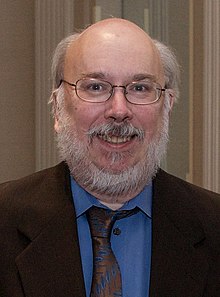Henry Jenkins | |
|---|---|
 Jenkins at the 2014 Peabody Awards | |
| Born | Henry Guy Jenkins III June 4, 1958 |
| Education | B.A., Political Science & Journalism, M.A., Communication Studies; Ph.D., Communication Arts |
| Alma mater | Georgia State University (BA) University of Iowa (MA) University of Wisconsin–Madison (PhD) |
| Occupation | university professor |
| Years active | 1992–present |
| Employer | University of Southern California |
| Known for | Theories of "transmedia storytelling" and "convergence culture" |
| Title | Provost Professor of Communication, Journalism and Cinematic Arts |
| Spouse | Cynthia |
| Children | 1 |
Henry Guy Jenkins III (born June 4, 1958) is an American media scholar and Provost Professor of Communication, Journalism, and Cinematic Arts, a joint professorship at the University of Southern California (USC) Annenberg School for Communication and Journalism and the USC School of Cinematic Arts.[1] He also has a joint faculty appointment with the USC Rossier School of Education.[2] Previously, Jenkins was the Peter de Florez Professor of Humanities as well as co-founder[3] and co-director (with William Uricchio) of the Comparative Media Studies program at the Massachusetts Institute of Technology (MIT). He has also served on the technical advisory board at ZeniMax Media, parent company of video game publisher Bethesda Softworks.[4] In 2013, he was appointed to the board that selects the prestigious Peabody Award winners.[5]
Jenkins has authored and co-authored over a dozen books including By Any Media Necessary: The New Youth Activism (2016), Spreadable Media: Creating Value and Meaning in a Networked Culture (2013), Convergence Culture: Where Old and New Media Collide (2006), Textual Poachers: Television Fans and Participatory Culture (1992), and What Made Pistachio Nuts?: Early Sound Comedy and the Vaudeville Aesthetic (1989).
Beyond his home country of the United States and the broader English-speaking world, the influence of Jenkins' work (especially his transmedia storytelling and participatory culture work) on media academics as well as practitioners has been notable, for example, across Europe[6] as well as in Brazil[7] and India.[8]
- ^ "Henry Jenkins - USC Annenberg School for Communication and Journalism".
- ^ "Profile - Rossier School of Education".
- ^ Keith Stuart (2008-10-08). "Henry Jenkins on the eight biggest game myths". the Guardian.
- ^ "ZeniMax Media Profile-Technical Advisory Board". ZeniMax.com. 2001. Archived from the original on October 8, 2001. Retrieved July 29, 2016.
- ^ "Jenkins named to George Foster Peabody Awards Board - Rossier School of Education". Rossier School of Education. 2013-10-28. Archived from the original on 2019-01-02. Retrieved 2017-04-26.
- ^ "Au Revoir: Heading to Europe". May 2012.
- ^ "My Big Brazilian [sic] Adventure". 7 June 2010.
- ^ "Why I Went to India…". 2 September 2015.